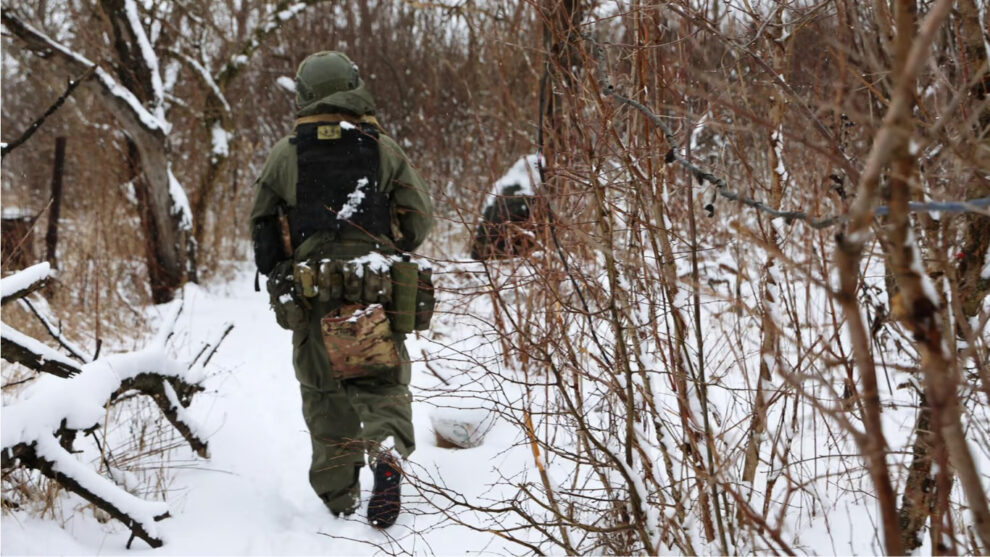Volunteer Vladimir Tatarenko from Mariupol was one of the “Angels of Taira,” the volunteer unit of the famous Ukrainian paramedic Yulia Paevskaya. During the full-scale invasion of the Russian army, Vladimir delivered wounded military and civilians to doctors. At the Azovstal plant, a man was responsible for maintaining a hospital in a bunker. Then he was captured. First to a colony in the village of Olenovka (Elenovka) near occupied Donetsk, and then to a Russian prison. At the end of October 2022, Tatarenko returned to Ukraine thanks to a prisoner exchange.
“This is a breath of freedom. This is a lump that went away after some time, then calls to relatives and friends began. Looking at the clouds, enjoying the flight of birds. You begin to see the world differently,” recalls Vladimir. Before the full-scale war, the man was engaged in business. Tatarenko and his family arrived in his native Mariupol on February 22, two days before the invasion of the Russian army: “In the first days I tried to get into the military registration and enlistment office, but to no avail. Because there was panic and airstrikes constantly. I called my friends in the “Angels of Taira” and asked “How can I help? That’s how it all started.”
Vladimir with the “Angels of Tyra” helped civilians and Ukrainian military in the city. Evacuated the wounded. And then he ended up at Azovstal, where he remained with the Ukrainian military until the end: “It was very similar to Dante’s Divine Comedy. When you go down the first three steps to hell and each step is a certain period. You think: “ This is hell.” And some time passes, you go down another step.”
At the Azovstal plant, Tatarenko was responsible for providing a hospital in the bunker. The room, which was located three floors underground, was called “Zhelezyaka”: “It was a very scary place. No one wanted to go there of their own free will. Four flights to our hospital were air bombs. Lack of food, drinking water. But this did not break our spirit, there were no decadent moods, the guys stayed on top.”
At Azovstal, Vladimir took care not only of the wounded military, but also of the dead: “They wrote tags and put them in black bags. He made something like a morgue. A dry room without sun, closed. And we took the guys there, we had one like that “an improvised morgue. They laid out the packages evenly. Everyone left, but I stayed. I was the last to lay the cross on my brothers-in-arms.”
On the day the defenders of Mariupol were captured, May 20, 2022, Vladimir was the last to leave Azovstal. First he helped carry out the bodies of the dead, then the wounded: “Roughly speaking, I was still a guide there, I knew the routes of the plant, I led out the groups, first the heavy ones on stretchers. Then those who were lighter, and then everyone else. I went out with heavy thoughts, understood where we were going.”
First there was a colony in Olenovka in the occupied part of the Donetsk region, where Ukrainian prisoners were starved to death.
— The portions were not enough in terms of calories. And you need to pour a mixture of boiling water into yourself in two minutes. This is technically impossible to do because it causes spasms. And if you didn’t have time, then you got up and went, you can’t take the bowl. Both the larynx and esophagus were burned. People then had problems with the gastrointestinal tract. Water was brought by a fire truck pumped from the swamp. They tried to boil it.
– How much weight have you lost?
– By 20 kilograms.
– Are you at your weight now?
– Yes.
— And what number did you return with?
– 60 kilograms somewhere.
Some Ukrainian soldiers were able to bring mobile phones from Azovstal to Olenovka, says Vladimir. Therefore, at first it was possible to contact relatives: “You could send a note, its SMS was sent to a person. And that person already called relatives. I succeeded twice. To be honest, everyone was afraid to use this service, to take such a risk. It cost one piece of bread , and it’s not a fact that they will tell you that it will arrive. Bread was everything. Bread and cigarettes were the number one currency,” Tatarenko recalls.
In the same way, it was even possible to find out Ukrainian news: “It saved us, because the Russians were constantly telling our ears that everything was lost. But we already looked at it that way, we just smiled quietly.” The most terrible period of captivity for Vladimir was not in Olenovka, but when he was transferred to a Russian colony.
“Your eyes were blindfolded with tape, your hands were tightly tied. You had already been taken for a day and beaten constantly, that is, you were already in a faint state. They beat you terribly for 4-5 hours. Even a scarab, even a bull terrier was on your tattoo. It was pure sadism. And the worst thing is that against the backdrop of all this there was someone’s female laughter,” says the Ukrainian. In the cells, prisoners of war were forced to either stand for 16 hours in one place or squat three thousand times a day. All this was accompanied by regular torture, says Vladimir. They forced us to sing the Russian anthem with batons. But that’s not all: “Everyone was afraid to go to the shower, because when you’re all wet after cold water, in a room with tiles they start beating you with a shocker and batons. Your feet constantly slip, you can’t get up, and at the same time you They also beat me. This is their first form of entertainment. I had broken ribs, and they hit me in the same place, so they didn’t heal. Then they put wires on the fingers, or they tie my manhood to the wires. A guy, 21 years old, was sitting with me , conscript. What secrets can he know? He couldn’t talk for a day after the torture.”
Communication with other prisoners of war helped not to lose heart. Everyone tried to support each other: “We tried to communicate in a whisper with the guys, distract each other, tried not to talk about the kitchen, because everyone was hungry. We tried to talk about business, about life, about films, about the theater, we were distracted like that. I fell asleep with one single thought: what doesn’t kill you makes you stronger. If you haven’t died today, it means you’ve become one step stronger, one step closer to victory, you’re still going, you’re still on the way.”
Vladimir spent five months in Russian captivity. The day before the exchange, he was interrogated especially harshly. They threatened to shoot me: “They said that I was some kind of naval reconnaissance or infantryman, that I was not splitting up. Therefore, in the morning they would take me to execution. They saw that the dates of birth and execution coincided, and they were very happy that there would be even numbers on the sign “.
But the next day, Vladimir was taken not to be shot, but to be exchanged. It was just his 47th birthday: “We didn’t know where we were being taken, to be shot or what. Because they immediately changed us into the things we were wearing. And when they gave us a packed lunch, he began to reassure the guys that it was It’s like an exchange, they don’t give you dry rations for execution.”
After the exchange there was a long rehabilitation and treatment. Only a year after his release, Vladimir began to come to his senses and return to normal life. Now he lives with his family in Kyiv. Restores business. But you can’t erase the memories from your memory: “I wouldn’t wish anyone to endure this even for a day. But the fact that the guys are there now… It’s just a prayer that they hold on.”










